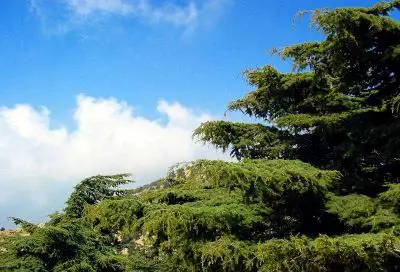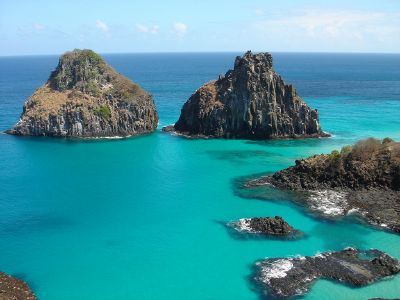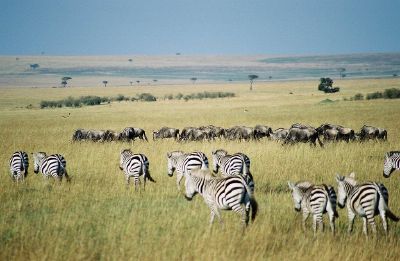Ecotourism
Ecotourism, or ecological tourism, is a type of tourism in which the travelers visit fragile, relatively pristine natural environments in such a way as to both minimize the impact on the environment and to actually benefit the environment and the local communities, with the later helping to provide an economic and social incentive to keep these local areas pristine. The term differs from sustainable tourism, responsible tourism, green tourism, and nature-based tourism in that ecotourism has the added dimension of actively benefiting the environment and the local communities.
Ecotourism typically involves travel to destinations where flora, fauna, and cultural heritage are the primary attractions. This low-impact, typically small-scale tourism supports conservation through education by offering tourists insight into the impact of human beings on the environment and fostering a greater appreciation of natural habitats. By improving the well-being of the local people, the communities have a vested interest in keeping the natural areas attractive to tourists. And ecotourism may also benefit the environment through direct financial contributions toward conservation.
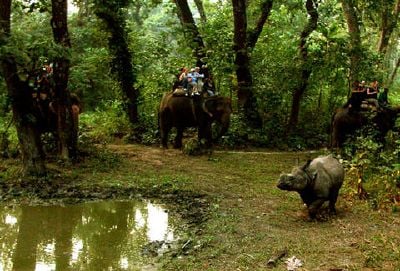
Given that ecotourism offers substantial economic incentives to protect environmental areas, it is often looked at as a great hope for both conservation and helping people, countering the exploitation of natural areas for personal economic gain. However, the term often is used simply as a marketing tool for practices that actually harm the environment or do not benefit the local communities. Furthermore, the success of ecotourism may also have unintended negative consequences for the environment or the local communities, unless responsibly managed. There also are intrinsic problems whereby "ecotourism companies" that keep more of their profits or pursue less environmentally friendly actions can gain competitive advantage over companies that invest more of their profits for conservation and helping the local communities.
Definitions
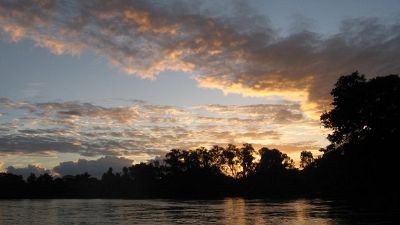
Ecotourism is a type of tourism. The World Tourism Organization (UNWTO), a United Nations agency, defines tourism as the activity of visitors, where a visitor is "a traveller taking a trip to a main destination outside his/her usual environment, for less than a year, for any main purpose (business, leisure or other personal purpose) other than to be employed by a resident entity in the country or place visited."[1]
Ecotourism lacks a universal definition. However, common elements include
- (1) visiting natural areas, which commonly are remote, virtually untouched, often protected ecosystems, but can include a natural area in an urban setting;
- (2) having low impact on the environment, and often involving tourism of small scale as opposed to mass tourism;
- (3) contributing to conservation of the natural environment visited, such as building awareness or providing direct funds for environmental conservation; and
- 4) benefiting the local communities, such as providing economic value through hiring guides, consuming local products, or staying at local facilities.
An early definition was provided by the Mexican architect Héctor Ceballos-Lascuráin, who in 1983 defined it as:
That form of environmentally responsible tourism that involves travel and visitation to relatively undisturbed natural areas with the object of enjoying, admiring, and studying the nature (the scenery, wild plants and animals), as well as any cultural aspect (both past and present) found in these areas, through a process which promotes conservation, has a low impact on the environment and on culture and favors the active and socioeconomically beneficial involvement of local communities.[2]
According to the definition and principles of ecotourism established by The International Ecotourism Society (TIES), ecotourism is:
Responsible travel to natural areas that conserves the environment, sustains the well-being of the local people, and involves interpretation and education.[3]
TIES also recognizes the following principles of ecotourism:
- Minimize physical, social, behavioral, and psychological impacts.
- Build environmental and cultural awareness and respect.
- Provide positive experiences for both visitors and hosts.
- Provide direct financial benefits for conservation.
- Generate financial benefits for both local people and private industry.
- Deliver memorable interpretative experiences to visitors that help raise sensitivity to host countries’ political, environmental, and social climates.
- Design, construct and operate low-impact facilities.
- Recognize the rights and spiritual beliefs of the Indigenous People in your community and work in partnership with them to create empowerment.[3]
The Australian Commission on National Ecotourism Strategy defines ecotourism as:
Nature-based tourism that involves education and interpretation of the natural environment and is managed to be ecologically sustainable.[4]
Martha Honey, in her book Ecotourism and Sustainable Development, lists seven characteristics of ecotourism:[5]
- Involves travel to natural destinations.
- Minimizes impact.
- Builds environmental awareness
- Provides direct financial benefits for conservation
- Provides financial benefits and empowerment for local people
- Respects local culture
- Supports human rights and democratic movements
Although the terms are often treated as if synonymous, ecotourism differs from such terms as sustainable tourism, responsible tourism, nature-based tourism, and green tourism. Sustainable tourism refers to tourism that does not deplete the natural resources and allows future generations to have the same opportunity as current tourists. Responsible tourism is one that minimizes negative impacts on the environment. Nature-based tourism is travel with a focus on nature, whether or not such activity is sustainable or responsible. Green tourism, while often used interchangeably with ecotourism, is travel, activity, or facility operating in an environmentally friendly manner.
Ecotourism differs from these in including not just travel to natural destinations and minimizing impact, but providing benefits for the environment in terms of conservation (education, direct financial), as well as economic and social benefits for the local communities, such that the local people have a vested interest in protecting their environment.[6]
History
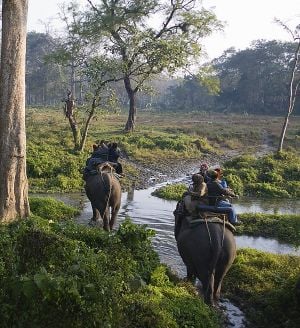
Hector Ceballos-Lascurain popularized, and also claimed to have coined, the term 'ecotourism' in July 1983, when he was performing the dual role of Director General of Standards and Technology of SEDUE (the Mexican Ministry of Urban Development and Ecology) and founding president of PRONATURA (an influential Mexican conservationist NGO). PRONATURA was lobbying for the conservation of the wetlands in northern Yucatán as breeding and feeding habitats of the American Flamingo. He also claimed to have provided the preliminary definition for ecotourism later that year, at a presentation in Mexico City for PRONATURA.[2]
Others claim the term was in use earlier: Claus-Dieter (Nick) Hetzer, an academic and adventurer from Forum International in Berkeley, CA, is said to have coined the term in 1965 and ran the first ecotours in the Yucatán during the early 1970s.[7]
Ecotourism, responsible tourism, jungle tourism, and sustainable development have become prevalent concepts since the mid 1980s, and ecotourism has experienced arguably the fastest growth of all sub-sectors in the tourism industry. The popularity represents a change in tourist perceptions, increased environmental awareness, and a desire to explore natural environments.[8] At times, such changes become as much a statement affirming one's social identity, educational sophistication, and disposable income as it has about preserving the Amazon rainforest or the Caribbean reef for posterity.[9]
For many countries, ecotourism is not simply a marginal activity to finance protection of the environment, but has become a major industry of the national economy. For example, in Costa Rica, Ecuador, Nepal, Kenya, Madagascar, and Antarctica, ecotourism represents a significant portion of the gross domestic product and economic activity.[10]
Challenges
There have been a number of negative impacts and challenges associated with ecotourism. Often, the negative impacts are associated with the fact that "ecotour" companies may be promoting a form of tourism that is not true ecotourism according to the definitions presented above.
Definitions
In the continuum of tourism activities that stretch from conventional tourism to ecotourism proper, there has been a lot of contention to the limit at which biodiversity preservation, local social-economic benefits, and environmental impact can be considered "ecotourism." For this reason, environmentalists, special interest groups, and governments define ecotourism differently. Environmental organizations have generally insisted that ecotourism is nature-based, sustainably managed, conservation supporting, and environmentally educated.[11] The tourist industry and governments, however, focus more on the product aspect, often treating ecotourism as equivalent to any sort of tourism based in nature. As a further complication, many terms are used under the rubric of ecotourism. Nature tourism, low impact tourism, green tourism, bio-tourism, ecologically responsible tourism, and others have been used in literature and marketing, although they are not necessarily synonymous with ecotourism, as noted above.[9][6]
The problems associated with defining ecotourism have led to confusion among tourists and academics. Definitional problems are also subject of considerable public controversy and concern because of green washing, a trend towards the commercialization of tourism schemes disguised as sustainable, nature based, and environmentally friendly ecotourism.[9] These schemes can be environmentally destructive, economically exploitative, and culturally insensitive at their worst. They are also morally disconcerting because they mislead tourists and manipulate their concerns for the environment.[12] The development and success of such large scale, energy intensive, and ecologically unsustainable schemes are a testament to the tremendous profits associated with being labeled as ecotourism.
In other words, the concept of ecotourism is often misunderstood and used as a marketing tool to promote tourism that is related to nature, but does not promote conservation of the environment or improvement of the well-being of people in the local communities. For example, the tourism company may use tour guides, transport, and hotels from outside the area, perhaps in the nearest big city, and thus the local people do not gain economically. Sometimes, the term ecotourism is used for the placing a hotel in a splendid landscape, to the detriment of the ecosystem. According to the definition of ecotourism presented above, such practices are not true ecotourism, and may be referred to as "pseudo-ecotourism."
Responsible ecotourism includes programs that minimize the negative aspects of conventional tourism on the environment and enhance the cultural integrity of local people. Therefore, in addition to evaluating environmental and cultural factors, an integral part of ecotourism is the promotion of recycling, energy efficiency, water conservation, and creation of economic opportunities for local communities.[8]
Negative environmental impacts
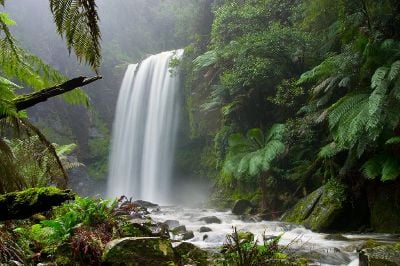
Ecotourism operations occasionally fail to live up to conservation ideals, even where efforts are being made to meet many of the conditions for ecotourism. At the local level, ecotourism has become a source of conflict over control of land, resources, and tourism profits, which has led to harming the environment and the local people. Ecotourism also may have more limited potential for protecting the environment than is assumed. Although ecotourism is intended for small groups, even a modest increase in population, however temporary, puts extra pressure on the local environment and necessitates the development of additional infrastructure and amenities. The construction of water treatment plants, sanitation facilities, and lodges come with the exploitation of non-renewable energy sources and the utilization of already limited local resources.[13] The conversion of natural land to such tourist infrastructure is implicated in deforestation and habitat deterioration of butterflies in Mexico and squirrel monkeys in Costa Rica.[14] In other cases, the environment suffers because local communities are unable to meet the infrastructure demands of ecotourism. The lack of adequate sanitation facilities in many East African parks results in the disposal of campsite sewage in rivers, contaminating the wildlife, livestock, and people who draw drinking water from it.[9]
Although ecotourists may be considered to be educationally sophisticated and environmentally concerned, the reality is that many do not understand the ecological consequences of their visits and how their day-to-day activities append physical impacts on the environment. As one scientist observes, they "rarely acknowledge how the meals they eat, the toilets they flush, the water they drink, and so on, are all part of broader regional economic and ecological systems they are helping to reconfigure with their very activities."[9] Nor do ecotourists recognize the great consumption of non-renewable energy required to arrive at their destination, which is typically more remote than conventional tourism destinations. For instance, an exotic journey to a place 10,000 kilometers away consumes about 700 liters of fuel per person.[15] Aside from environmental degradation with tourist infrastructure, population pressures from ecotourism also leaves behind garbage and pollution.[16]
Ecotourism activities are issues of environmental impact because they disturb fauna and flora. Ecotourists believe that because they are only taking pictures and leaving footprints, they keep ecotourism sites pristine, but even harmless sounding activities such as a nature hike can be ecologically destructive. In the Annapurna Circuit in Nepal, ecotourists have worn down the marked trails and created alternate routes, contributing to soil impaction, erosion, and plant damage. Where the ecotourism activity involves wildlife viewing, it can scare away animals, disrupt their feeding and nesting sites, or acclimate them to the presence of people. In Kenya, wildlife-observer disruption drives cheetahs off their reserves, increasing the risk of inbreeding and further endangering the species.[9]
The number of motor vehicles crossing a nature park increases as tour drivers search for rare species. The number of roads can disrupt the grass cover, which impacts plant and animal species. These areas also have a higher rate of disturbances and invasive species because of all the traffic moving off the beaten path into new undiscovered areas. Ecotourism also has an effect on species through the value placed on them, and if valued, there may be an overproduction of them.[17]
Insufficient benefits
While ecotourism technically involves providing benefits to the local communities, these benefits may be very limited. Most forms of ecotourism are owned by foreign investors and corporations that provide few benefits to local communities. An overwhelming majority of profits are put into the pockets of investors instead of reinvestment into the local economy or environmental protection. The limited numbers of local people who are employed in the economy enter at its lowest level, and are unable to live in tourist areas because of meager wages and a two market system.[9] Furthermore, the lack of local infrastructure, local guides that know the flora and fauna or have the requisite skills, and so forth, may lead the ecotour company to utilize facilities and people from outside the local area.
Ecotourism often claims that it preserves and "enhances" local cultures. However, evidence shows that with the establishment of protected areas local people have illegally lost their homes, and most often with no compensation.[17] Pushing people onto marginal lands with harsh climates, poor soils, lack of water, and infested with disease does little to enhance livelihoods even when a proportion of ecotourism profits are directed back into the community. The establishment of parks can create harsh survival realities and deprive the people of their traditional use of land and natural resources. Ethnic groups are increasingly being seen as a "backdrop" to the scenery and wildlife. The local people struggle for cultural survival and freedom of cultural expression while being "observed" by tourists. Local indigenous people also have strong resentment towards the change:
Tourism has been allowed to develop with virtually no controls. Too many lodges have been built, too much firewood is being used and no limits are being placed on tourism vehicles. They regularly drive off-track and harass the wildlife. Their vehicle tracks criss-cross the entire Masai Mara. Inevitably, the bush is becoming eroded and degraded.[17]
One of the most powerful examples of communities being moved in order to create a park is the story of the Masai. About 70 percent of national parks and game reserves in East Africa are on Masai land. The first undesirable impact of tourism was that of the extent of land lost from the Masai culture. Local and national governments took advantage of the Masai’s ignorance on the situation and robbed them of huge chunks of grazing land, putting to risk their only socio-economic livelihood. In Kenya, the Masai also have not gained any economic benefits. Despite the loss of their land, employment favors better educated workers. Furthermore the investors in this area are not local and have not put profits back into local economy. In some cases game reserves can be created without informing or consulting local people, who come to find out about the situation when an eviction notice is delivered.[17]
Another source of resentment is the manipulation of the local people by their government. In some cases, the resentment by local people results in environmental degradation. As a highly publicized case, the Masai nomads in Kenya killed wildlife in national parks to show aversion to unfair compensation terms and displacement from traditional lands.[18] The lack of economic opportunities for local people also constrains them to degrade the environment as a means of sustenance.[9] The presence of affluent ecotourists encourage the development of destructive markets in wildlife souvenirs, such as the sale of coral trinkets on tropical islands and animal products in Asia, contributing to illegal harvesting and poaching from the environment. In Suriname, sea turtle reserves use a very large portion of their budget to guard against these destructive activities.
Mismanagement
While governments are typically entrusted with the administration and enforcement of environmental protection, they often lack the commitment or capability to manage ecotourism sites effectively. The regulations for environmental protection may be vaguely defined, costly to implement, hard to enforce, and uncertain in effectiveness.[19] Government regulatory agencies, as political bodies, are susceptible to making decisions that spend budget on politically beneficial but environmentally unproductive projects. Because of prestige and conspicuousness, the construction of an attractive visitor's center at an ecotourism site may take precedence over more pressing environmental concerns like acquiring habitat, protecting endemic species, and removing invasive ones.[9] Finally, influential groups can pressure and sway the interests of the government to their favor. The government and its regulators can become vested in the benefits of the ecotourism industry which they are supposed to regulate, causing restrictive environmental regulations and enforcement to become more lenient.
Management of ecotourism sites by private ecotourism companies offers an alternative to the cost of regulation and deficiency of government agencies. It is believed that these companies have a self interest in limited environmental degradation, because tourists will pay more for pristine environments, which translates to higher profit. However, theory suggests that this practice is not economically feasible and will fail to manage the environment.
There also is an issue of the cost-benefit ratio creating a pressure away from using profits for environmental conservation and the benefit of the local communities.
For example, the model of monopolistic competition states that distinctiveness will entail profits, but profits will promote imitation. A company that protects its ecotourism sites is able to charge a premium for the novel experience and pristine environment. But when other companies view the success of this approach, they also enter the market with similar practices, increasing competition, and reducing demand, and with reduced demand, reduced economic profit. A cost-benefit analysis shows that the company bears the cost of environmental protection without receiving the gains. Without economic incentive, the whole premise of self interest through environmental protection is quashed; instead, ecotourism companies will minimize environment-related expenses and maximize tourism demand.[9]
The tragedy of the commons offers another model for economic unsustainability from environmental protection, in ecotourism sites utilized by many companies.[20] Although there is a communal incentive to protect the environment, maximizing the benefits in the long run, a company will conclude that it is in their best interest to utilize the ecotourism site beyond its sustainable level. By increasing the number of ecotourists, for instance, a company gains all the economic benefit while paying only a part of the environmental cost. In the same way, a company recognizes that there is no incentive to actively protect the environment; they bear all the costs, while the benefits are shared by all other companies. The result, again, is mismanagement.
In other words, competition can lead companies toward practices that are less favorable for the environment and the local communities. If the ecotourism company finds it is losing its competitive advantage to companies that are keeping more of their profits or using more economical facilities, guides, etc., from outside the area, then it will also feel pressure to keep profits that it may pour into conservation or the local communities.
Taken together, the mobility of foreign investment and lack of economic incentive for environmental protection means that ecotourism companies are disposed to establishing themselves in new sites once their existing one is sufficiently degraded.
Improving sustainability
Regulation and accreditation
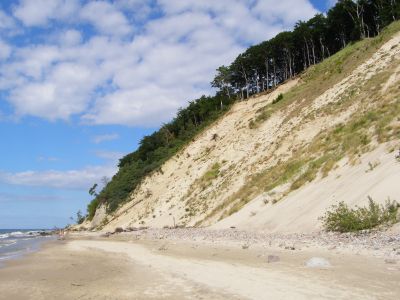
Because the regulation of ecotourism is poorly implemented or nonexistent, and the terminology is used imprecisely, ecologically destructive operations like underwater hotels, helicopter tours, and wildlife theme parks often are categorized as ecotourism along with canoeing, camping, photography, and wildlife observation. The failure to clearly identify responsible, low impact ecotourism as such, versus "pseudo-ecotourism," puts true ecotourism companies at a competitive disadvantage.
Many environmentalists have argued for a global standard of accreditation, differentiating ecotourism companies based on their level of environmental commitment. A national or international regulatory board would enforce accreditation procedures, with representation from various groups including governments, hotels, tour operators, travel agents, guides, airlines, local authorities, conservation organizations, and non-governmental organizations.[21] The decisions of the board would be sanctioned by governments, so that non-compliant companies would be legally required to disassociate themselves from the use of the ecotourism brand.
Another suggestion is a Green Stars System, based on criteria including a management plan, benefit for the local community, small group interaction, education value and staff training.[22] Ecotourists who consider their choices would be confident of a genuine ecotourism experience when they see the higher star rating.
In addition, environmental impact assessments could be used as a form of accreditation. Feasibility is evaluated from a scientific basis, and recommendations could be made to optimally plan infrastructure, set tourist capacity, and manage the ecology. This form of accreditation is more sensitive to site specific conditions.
Guidelines and education
An environmental protection strategy must address the issue of ecotourists removed from the cause-and-effect of their actions on the environment. More initiatives should be carried out to improve their awareness, sensitize them to environmental issues, and care about the places they visit.[9]
Tour guides are an obvious and direct medium to communicate awareness. With the confidence of ecotourists and intimate knowledge of the environment, they can actively discuss conservation issues. A tour guide training program in Costa Rica's Tortuguero National Park has helped mitigate negative environmental impacts by providing information and regulating tourists on the parks' beaches used by nesting endangered sea turtles.[23]
Local control
The underdevelopment theory of tourism describes a form of economic domination by multinational corporations that control ecotourism resources. These corporations finance and profit from the development of large scale ecotourism, which causes excessive environmental degradation, loss of traditional culture and way of life, and exploitation of local labor. In Zimbabwe and Nepal's Annapurna region, where underdevelopment is taking place, more than 90 percent of ecotourism revenues are expatriated to the parent countries, and less than 5 percent go into local communities.[24]
The lack of sustainability suggests the need for small scale, slow growth, and locally based ecotourism. Local peoples have a vested interest in the well being of their community, and are therefore more accountable to environmental protection than multinational corporations. The lack of control, westernization, adverse impacts to the environment, and loss of culture and traditions outweigh the benefits of establishing large scale ecotourism.
The increased contributions of communities to locally managed ecotourism create viable economic opportunities, including high level management positions, and reduce environmental issues associated with poverty and unemployment. Because the ecotourism experience is marketed to a different lifestyle from large scale ecotourism, the development of facilities and infrastructure does not need to conform to corporate Western tourism standards, and can be much simpler and less expensive. There is a greater multiplier effect on the economy, because local products, materials, and labor are used. Profits accrue locally and import leakages are reduced.[18] However, even this form of tourism may require foreign investment for promotion or start up. When such investments are required, it is crucial for communities to find a company or non-governmental organization that reflects the philosophy of ecotourism; sensitive to their concerns and willing to cooperate at the expense of profit.
The basic assumption of the multiplier effect is that the economy starts off with unused resources; for example, that many workers are cyclically unemployed and much of industrial capacity is sitting idle or incompletely utilized. By increasing demand in the economy, it is then possible to boost production. If the economy was already at full employment, with only structural, frictional, or other supply-side types of unemployment, any attempt to boost demand would only lead to inflation. For various laissez-faire schools of economics, which embrace Say's Law and deny the possibility of Keynesian inefficiency and under-employment of resources, therefore, the multiplier concept is irrelevant or wrong-headed.
As an example, consider the government increasing its expenditure on roads by $1 million, without a corresponding increase in taxes. This sum would go to the road builders, who would hire more workers and distribute the money as wages and profits. The households receiving these incomes will save part of the money and spend the rest on consumer goods. These expenditures in turn will generate more jobs, wages, and profits, and so on with the income and spending circulating around the economy. Tax revenues would also increase with the increased jobs, wages, and profits.
The multiplier effect arises because of the induced increases in consumer spending that occur due to the increased incomes—and because of the feedback into increasing business revenues, jobs, and income again. This process does not lead to an economic explosion not only because of the supply-side barriers at potential output (full employment) but because at each "round," the increase in consumer spending is less than the increase in consumer incomes. That is, the marginal propensity to consume (mpc) is less than one, so that each round some extra income goes into saving, leaking out of the cumulative process. Each increase in spending is thus smaller than that of the previous round, preventing an explosion. Ecotourism has to be implemented with care.
See also
Notes
- ↑ Travel and tourism International Recommendations for Tourism Statistics 2008, New York, 2010. Retrieved January 23, 2023.
- ↑ 2.0 2.1 An Interview with…Héctor Ceballos-Lascuráin InkaTerra, November 7, 2014. Retrieved January 23, 2023.
- ↑ 3.0 3.1 What is ecotourism The International Ecotourism Society (TIES), 2015. Retrieved January 23, 2023.
- ↑ M. Merg, Defining ecotourism, Untamed Path (2007).
- ↑ M. Honey, Ecotourism and Sustainable Development: Who Owns Paradise? (Washington, DC: Island Press, 2008, ISBN 1597261254).
- ↑ 6.0 6.1 M. Merg, "What is ecotourism," Untamed Path (2007).
- ↑ D. B. Weaver, The Encyclopedia of Ecotourism (New York: Cabi, 2001, ISBN 0851993680).
- ↑ 8.0 8.1 A. Randall, Resource Economics (New York: John Wiley and Sons, 1987, ISBN 047187468X).
- ↑ 9.00 9.01 9.02 9.03 9.04 9.05 9.06 9.07 9.08 9.09 9.10 A. Tuohino, and A. Hynonen, Ecotourism: Imagery and reality. Reflections on concepts and practices in Finnish rural tourism, Nordia Geographical Publications 30(4) (2001):21–34.
- ↑ W. R. Eadington, and V.L. Smith, The emergence of alternative forms of tourism, in W. R. Eadington, Tourism Alternatives: Potentials and Problems in the Development of Tourism (Philadelphia, PA: University of Pennsylvania Press, 1992, ISBN 0812231481).
- ↑ R. Buckley, Research note: A framework for ecotourism, Annals of Tourism Research 21(3) (1994):661–669.
- ↑ D. Barkin, Ecotourism for sustainable regional development, Current Issues in Tourism 5 (2002): 245–253.
- ↑ L. Vivanco, Ecotourism: Paradise lost. A Thai case study, The Ecologist 32(2) (2002):28–30.
- ↑ J. C. Isaacs, The limited potential of ecotourism to contribute to wildlife conservation, The Ecologist 28 (2000): 61–69.
- ↑ D. Mellgren, Travel experts see worrisome downside to ecotourism Environmental News Network, May 16, 2007. Retrieved January 23, 2023.
- ↑ D. McLaren, Rethinking Tourism and Ecotravel: The Paving of Paradise and What You Can Do to Stop It (West Hartford, CT: Kamarian Press, 1998, ISBN 1565490665).
- ↑ 17.0 17.1 17.2 17.3 O. Kamauro, Ecotourism: Suicide or Development All Africa, October 1, 2007. Retrieved January 23, 2023.
- ↑ 18.0 18.1 E. Cater, and G. Lowman, Ecotourism in the Third World: Problems and Prospects for Sustainability," in E. Cater and G. Lowman, Ecotourism: A Sustainable option?" (United Kingdom: John Wiley and Sons, 1994, ISBN 0471948969).
- ↑ W. J. Baumol, W. E. Oates, and S. A. Batey Blackman, Economics, Environmental Policy, and Quality of Life (Englewood Cliffs, NJ: Prentice Hall, 1979, ISBN 0132313650).
- ↑ G. Hardin, The tragedy of the commons, Science 162 (1968): 1243-1248.
- ↑ M. Elper-Wood, Ecotourism at a crossroads: Charting the way forward, The Final Report from the Conference of Ecotourism at the Crossroads (Nairobi, Kenya, 1998).
- ↑ D. Crinion, South Australian tourism strategy and the role of ecotourism, Down to Earth Planning for an Out-of-the-Ordinary Industry (Adelaide, Australia: South Australian Ecotourism Forum, 1998).
- ↑ S. K. Jacobson, and R. Robles, "Ecotourism, sustainable development, and conservation education: Development of a tour guide training program in Tortuguero, Costa Rica," Environmental Management 16(6) (1998):701–713.
- ↑ K. Ziffer, Ecotourism: The Uneasy Alliance (Conservation International/Ernst and Young, 1998).
ReferencesISBN links support NWE through referral fees
- Baumol, W. J., and W. E. Oates. Economics, Environmental Policy, and Quality of Life. Englewood Cliffs, NJ: Prentice Hall, 1979. ISBN 0132313650
- Cater, E., and G. Lowman (eds.). Ecotourism: A Sustainable option? United Kingdom: John Wiley and Sons, 1994. ISBN 0471948969
- Eadington, W. R. Tourism Alternatives: Potentials and Problems in the Development of Tourism. Philadelphia, PA: University of Pennsylvania Press, 1992. ISBN 0812231481
- Honey, M. Ecotourism and Sustainable Development: Who Owns Paradise?. Washington, DC: Island Press, 2008. ISBN 1597261254
- McLaren, D. Rethinking Tourism and Ecotravel: The Paving of Paradise and What You Can Do to Stop It. West Hartford, CT: Kamarian Press, 1998. ISBN 1565490665
- Randall, A. Resource Economics, 2nd edition. New York: John Wiley and Sons, 1987. ISBN 047187468X
- Smith, V.L., and W. R. Eadington (eds.). Tourism Alternatives: Potentials and Problems in the Development of Tourism. Philadelphia, PA: University of Pennsylvania Press, 1992. ISBN 0812231481
- Weaver, D. B. (ed.). The Encyclopedia of Ecotourism. New York: Cabi, 2001. ISBN 0851993680
Credits
New World Encyclopedia writers and editors rewrote and completed the Wikipedia article in accordance with New World Encyclopedia standards. This article abides by terms of the Creative Commons CC-by-sa 3.0 License (CC-by-sa), which may be used and disseminated with proper attribution. Credit is due under the terms of this license that can reference both the New World Encyclopedia contributors and the selfless volunteer contributors of the Wikimedia Foundation. To cite this article click here for a list of acceptable citing formats.The history of earlier contributions by wikipedians is accessible to researchers here:
The history of this article since it was imported to New World Encyclopedia:
Note: Some restrictions may apply to use of individual images which are separately licensed.

